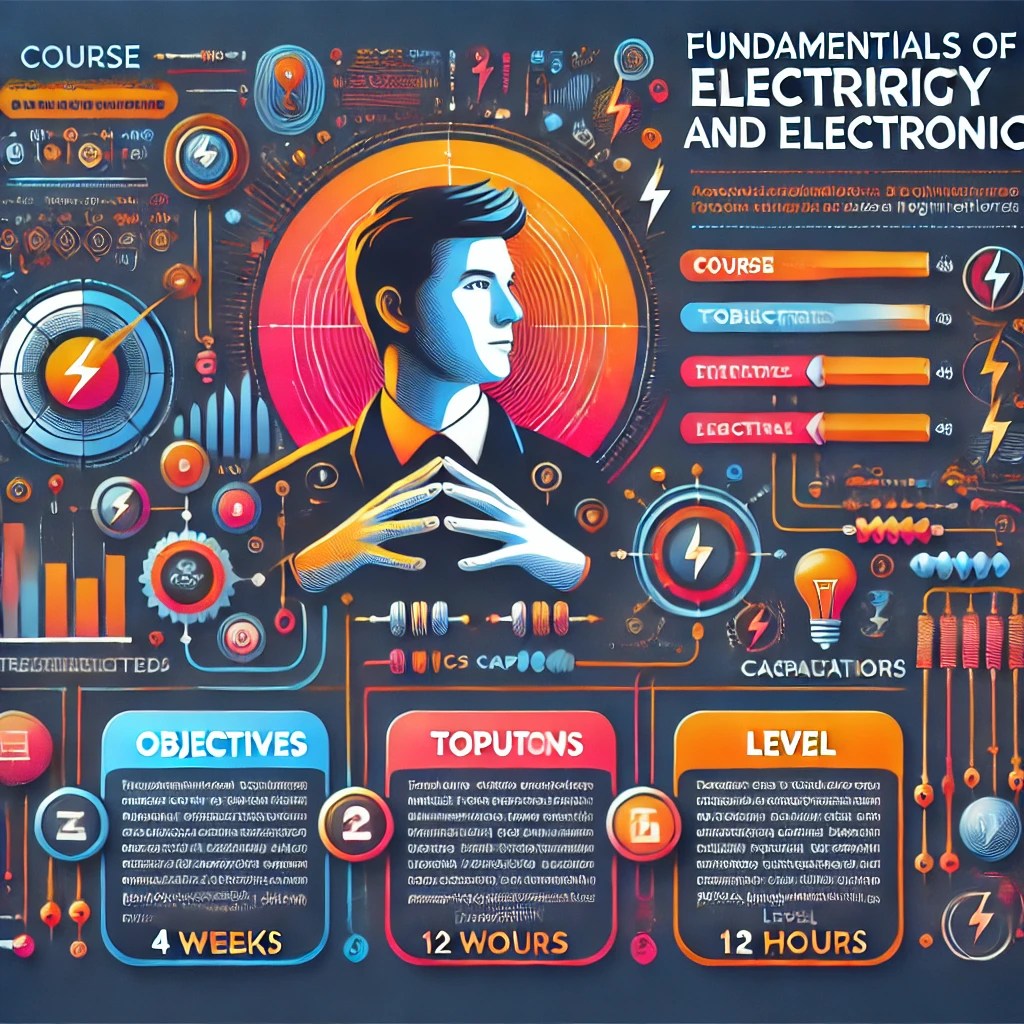
About Course
Technician Course
Course Title: Fundamentals of Electricity and Electronics
Course Code: 28001EL-TECH
Duration: 4 Weeks (12 Training Hours)
Level: Beginner
🎯 Course Objectives
-
Understand the basic principles of electricity and electronics.
-
Identify and utilize essential electronic components.
-
Read and design simple electrical and electronic circuits.
-
Gain practical experience in building and testing circuits.
👥 Target Audience
-
Technical and engineering students.
-
Entry-level technicians exploring electricity and electronics.
-
Hobbyists and beginners in electronics projects.
-
Anyone seeking a solid foundation in electricity and electronics before advancing further.
📘 What You Will Learn
By the end of this course, you will be able to:
-
Explain key electrical concepts such as voltage, current, and resistance.
-
Identify and use basic electronic components (resistors, capacitors, transistors, etc.).
-
Read and build basic electrical and electronic circuits.
-
Use measuring tools (Multimeter) to test circuits and components.
-
Apply theoretical knowledge through hands-on mini-projects.
🧰 Included Materials
-
Full electronic course handbook (PDF).
-
Worksheets and practical exercises.
-
Project diagrams and sample circuit files.
-
Short video demonstrations.
-
Certificate of Completion (digital).
⚙️ Requirements / Instructions
-
No prior knowledge required — suitable for complete beginners.
-
Notebook and pen for taking notes.
-
A basic calculator is recommended.
-
Active participation in practice sessions is encouraged.
-
Recommended tools: Multimeter, breadboard, jumper wires, resistors, capacitors, LEDs, diodes, and transistors (kits may be provided by the center or required individually).
📅 Weekly Course Outline (In Detail)
Week 1: Introduction to Electricity and Electronics
🕒 Duration: 3 Hours
Objectives:
-
Grasp core electrical principles.
-
Distinguish between electrical and electronic systems.
Topics Covered:
-
What is electricity? What is electronics?
-
Electric charge and current (AC vs DC).
-
Voltage and resistance.
-
Ohm’s Law and basic calculations.
-
Series and parallel circuits.
Hands-On Activities:
-
Measuring voltage, current, and resistance using a multimeter.
-
Simple Ohm’s Law exercises.
Week 2: Basic Electronic Components
🕒 Duration: 3 Hours
Objectives:
-
Recognize the function and use of passive components.
Topics Covered:
-
Resistors: Fixed, variable, photoresistors; color code reading.
-
Capacitors: Ceramic vs electrolytic; how they store energy.
-
Inductors: Basic concept and application.
-
Conductors vs insulators.
Hands-On Activities:
-
Identify real components.
-
Practice reading resistor values using color codes.
-
Simple capacitor charging/discharging experiment.
Week 3: Semiconductors and Circuit Basics
🕒 Duration: 3 Hours
Objectives:
-
Understand active components (diodes, transistors) and their behavior.
Topics Covered:
-
Semiconductors: Introduction and importance.
-
Diodes: Standard, LED, Zener; polarity and behavior.
-
Transistors: BJT, MOSFET basics; use as switch/amplifier.
-
Reading basic schematic diagrams.
Hands-On Activities:
-
Testing a diode with a multimeter.
-
Build a simple LED circuit with current-limiting resistor.
-
Analyze basic circuit diagram.
Week 4: Applications and Practical Exercises
🕒 Duration: 3 Hours
Objectives:
-
Apply all learned knowledge in real-world mini-projects.
Topics Covered:
-
Building simple circuits (LED flasher, switch circuit, basic sensor).
-
Using a multimeter for testing.
-
Troubleshooting circuit faults.
-
Final practical project (optional).
Hands-On Activities:
-
Breadboard circuit assembly.
-
Component testing and fault analysis.
-
Mini circuit build and evaluation.
🧾 Learning Outcomes Summary
Upon completion, learners will be able to:
-
Understand and apply essential electricity/electronics concepts.
-
Identify and work with basic components confidently.
-
Build, test, and troubleshoot small circuits.
-
Read and interpret basic circuit diagrams.
Course Content
Fundamentals of Electricity and Electronics
Student Ratings & Reviews



